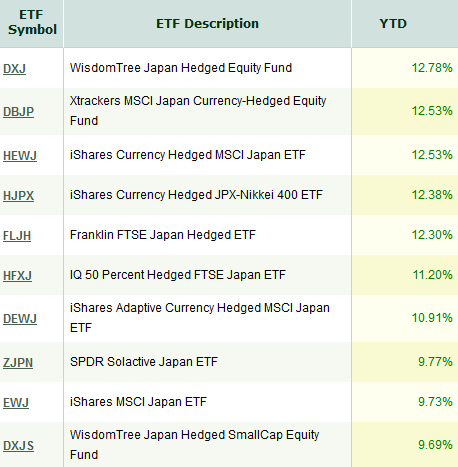The iShares MSCI Japan ETF (NYSEArca: EWJ), one of the largest Japan exchange traded funds (ETFs) listed in the U.S., is up nearly 10% this year and recently saw a substantial influx of assets.
EWJ seeks to track the investment results of the MSCI Japan Index, which consists of stocks traded primarily on the Tokyo Stock Exchange. It may include large- or mid-capitalization companies.
“Japanese stocks were a remarkably hot commodity among investors last week, according to the latest fund flows data (via Bank of America-Merrill Lynch),” reports Schaeffer’s Investment Research. “BAML reports inflows of $5.4 billion into Japanese equity funds during the week ended April 24, yielding their biggest one-week take since March 2018.”
Japan itself is recovering from its own economic doldrums with employment rates and wage growth starting to come to life. This is a welcome sign, particularly after the last 30 years have been marked by stagnant growth following an asset bubble burst that spawned the “Lost Decade” of Japan in the early 90s to the early 2000s.

Chart via XTF.com
What’s Next for EWJ ETF
“And while EWJ has gained a respectable 9% since the start of 2019 — thanks in part to the newly regained support of its 50-day moving average — it’s not difficult to see why investor enthusiasm is currently lacking toward this particular Japanese equity tracker,” according to Schaeffer’s. “Since the very first day of April, EWJ has been butting its head unsuccessfully against resistance at the $55.50 level. This region has been a technical sticking point since it was breached to the downside during a late-October bear gap, and it has held firm as a technical ceiling this month despite multiple challenges by the shares.”
Japanese stock markets have remained range bound for most of 2019 as it slowly recovers from the recent selling pressure. Nevertheless, the developed market is still outperforming the global developed ex-U.S. equities benchmark and it is less expensive. BlackRock, though, maintains a neutral outlook on this country.
Nevertheless, Japan does show some solid fundamentals. Specifically, the weaker yen, strong corporate fundamentals, bargain valuations and central bank buying are all positives. Furthermore, Japan’s political temperature is relatively stable.
“Investors may yet be due for a bit more consolidation and coiling on the part of EWJ shares before we witness a big breakout one way or the other, as the island nation now begins a week-plus trading holiday,” notes Schaeffer’s. “But in any event, the next update on Japanese equity flows should be illuminating, given that the aforementioned round of data directly preceded the central bank’s Thursday decision to finally reveal an approximate duration for its ultra-accommodative policy stance.”
For more information on the Japanese markets, visit our Japan category.
The opinions and forecasts expressed herein are solely those of Tom Lydon, and may not actually come to pass. Information on this site should not be used or construed as an offer to sell, a solicitation of an offer to buy, or a recommendation for any product.


